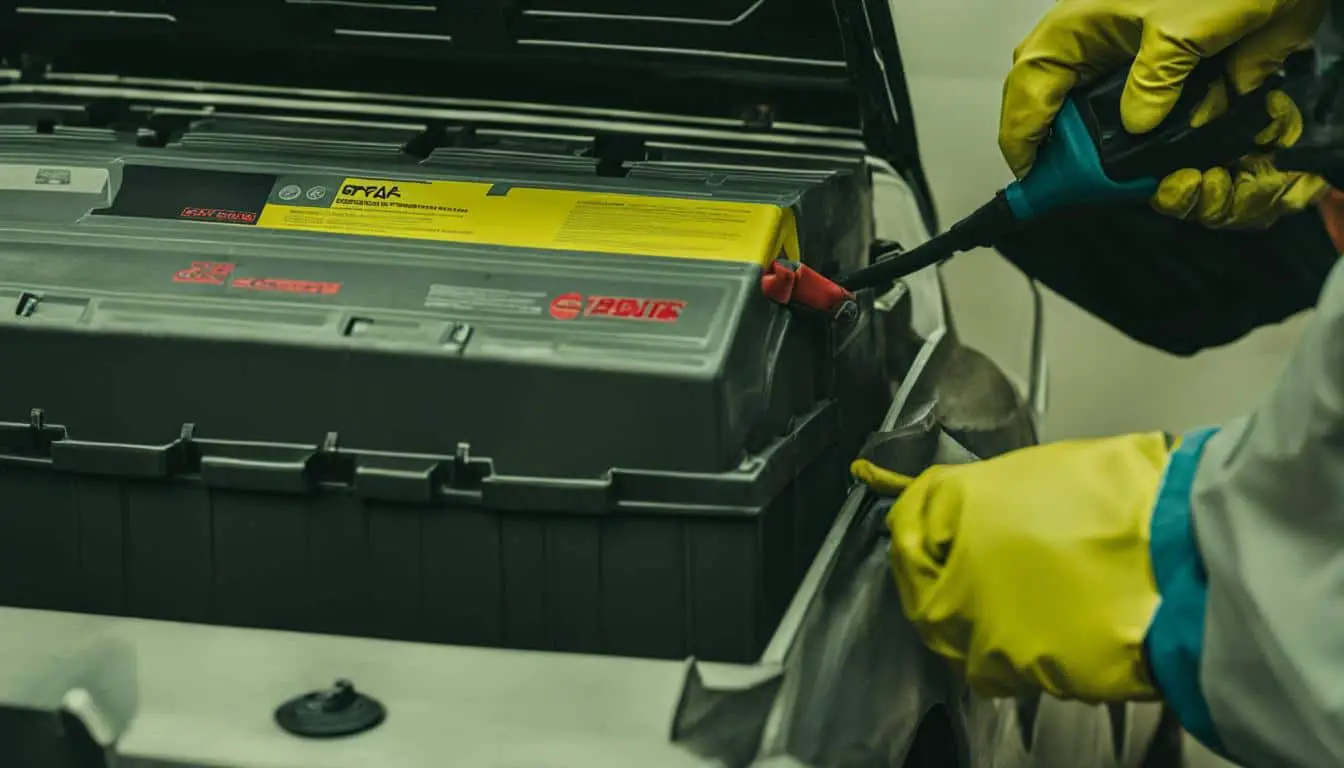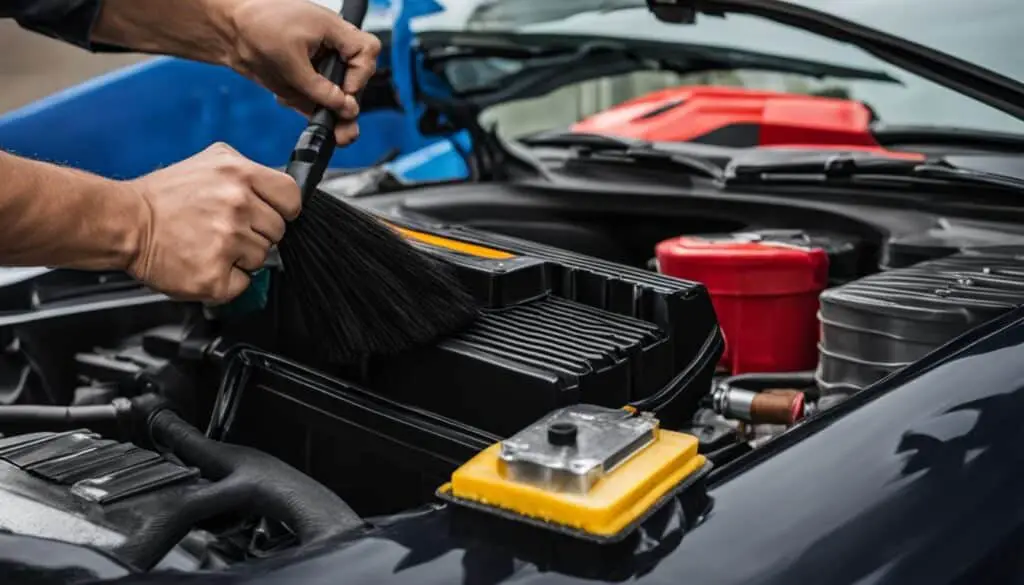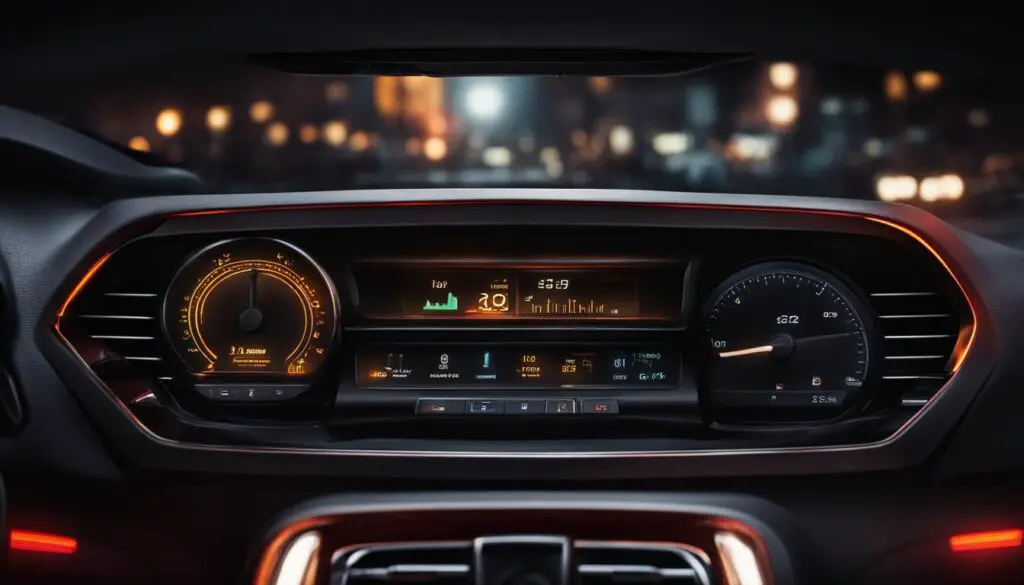
Car Battery Maintenance and Replacement Guide
Welcome to my comprehensive guide on car battery maintenance and replacement. As a professional journalist, I have seen many drivers stranded on the side of the road due to a dead battery. Therefore, I understand the importance of keeping your car battery in good condition to avoid any unexpected breakdowns. In this guide, I will share my expertise on how to maintain and replace your car battery, ensuring a smooth and reliable driving experience.
Key Takeaways:
- Regular car battery maintenance can extend its lifespan and prevent unexpected breakdowns.
- Signs of a failing car battery include slow engine cranking, dim headlights, and a bloated battery case.
- A car battery’s lifespan can be affected by factors such as temperature, usage, and maintenance.
- To choose the right replacement battery, check your car’s manual or consult with a mechanic.
- Proper disposal of your old car battery is essential for environmental safety.
How to Maintain Your Car Battery
Proper maintenance is crucial for maximizing the lifespan of your car battery. Regular care can help prevent issues and ensure optimal performance. Here are some tips on how to maintain your car battery:
1. Keep Your Battery Clean
Over time, dirt and debris can accumulate on your car battery, which can cause corrosion and impact its performance. Use a damp cloth and mild detergent to clean the battery terminals and remove any build-up. Remember to use gloves while cleaning, as battery acid can be harmful to the skin.
2. Check the Water Level
Some car batteries require distilled water to maintain their fluid levels. Check your owner’s manual to see if your battery requires this and how often it should be done. If your battery does require water, make sure to use distilled water and never add tap water. Check the water level regularly to ensure it stays within the recommended range.
3. Avoid Overcharging
Overcharging your battery can cause damage and reduce its lifespan. Use a charger that automatically shuts off when the battery is fully charged, or a trickle charger that maintains a low-level charge instead of continually charging.
4. Test Your Battery
Regularly testing your battery can help you identify potential issues before they become major problems. You can use a voltmeter to check the voltage of your battery or take it to a mechanic for a more accurate test.
5. Keep Your Battery Charged
If you don’t use your car often, your battery may become discharged, which can impact its lifespan. Consider using a battery maintainer to keep your battery charged when the car is not in use. Alternatively, you can take your car for a short drive once a week to keep the battery charged.
By following these tips, you can extend the lifespan of your car battery and ensure it stays in good condition for longer.

When to Replace Your Car Battery
If you properly maintain your car battery, it can last up to five years. However, at some point, all car batteries will need to be replaced.
The following signs may indicate that it’s time to replace your car battery:
- The engine cranks, but the car won’t start
- The battery warning light on your dashboard is illuminated
- The battery case appears swollen or bloated
- Your headlights are dimmer than usual
- You frequently need to jump-start your car
If you notice any of these signs, it’s important to have your battery tested as soon as possible. A failing battery can lead to more significant electrical problems in your car, such as alternator failure or damaged engine components.
Factors such as extreme temperatures and frequent short trips can also impact your car battery’s lifespan. To extend your car battery’s life:
- Avoid frequent short trips that don’t give your battery enough time to fully charge
- Park your car in a garage or shaded area to avoid extreme temperatures
- Turn off all lights and electronics when your car is parked to avoid draining the battery
- Have your battery regularly inspected and maintained by a professional
If you determine that it’s time to replace your car battery, it’s essential to choose the right replacement battery for your vehicle. You can check your car owner’s manual or consult a professional mechanic to determine the correct battery size and specifications for your car.

Remember, a healthy car battery is crucial for a reliable and safe driving experience. Don’t wait until it’s too late to replace a failing battery.
Conclusion
As I conclude this guide, I hope you now understand how important it is to take care of your car battery. Regular maintenance and timely replacement can save you from unexpected breakdowns and costly repairs.
Remember to follow the tips and guidelines shared in this guide to increase the longevity of your car battery. Performing regular inspections and cleaning, avoiding deep discharge, and disconnecting the battery when not in use are just some of the things you can do to keep your battery healthy.
Stay Vigilant
Keep an eye out for any signs of a failing battery, such as slow engine cranking, dimming lights, or frequent jump-starts. Getting your battery tested regularly by a professional can help you detect any issues early on and take corrective action.
The Importance of Choosing the Right Battery
When it is time to replace your car battery, make sure you choose the right one for your vehicle. Consider the size, type, and brand of the battery that is compatible with your car. Choosing the right battery will ensure it fits your car’s electrical system and provides the necessary power to start your engine.
By following the recommendations in this guide, you can take steps to maintain and replace your car battery with ease. Remember to prioritize your car battery maintenance and replacement as it can save you from a lot of hassle down the road.
FAQ
How often should I maintain my car battery?
It is recommended to perform regular maintenance on your car battery every three to six months.
What are the signs of a failing car battery?
Some common signs of a failing car battery include difficulty starting the engine, dim headlights, and a bloated battery case.
How can I extend the lifespan of my car battery?
To extend the lifespan of your car battery, make sure to keep it clean, avoid deep discharges, and avoid leaving your vehicle unused for long periods.
How do I choose the right replacement battery for my vehicle?
To choose the right replacement battery, refer to your vehicle’s owner’s manual or consult with a professional to ensure compatibility and proper fitment.
What is the average lifespan of a car battery?
The average lifespan of a car battery is typically around three to five years, but this can vary depending on various factors such as usage and climate.
Can I replace my car battery myself?
Yes, you can replace your car battery yourself. However, it is recommended to follow proper safety precautions and consult the vehicle’s manual for specific instructions.
What should I do if my car battery dies?
If your car battery dies, you can either jump-start it using jumper cables and another vehicle or call for roadside assistance to get your battery charged or replaced.
